形容词 副词 讲解
形容词和副词用法总结归纳讲解

C.especiallyD.luckily
12._____, the thief didn’t take anything valuable but my notebook.
A. Strange it isB. To be strange
C. Strangely enoughD. It was strange
C. surprisinglyD. hardly
4.—What do you think of the plan?
—I feel_____that we ought to give it up at once.
A. strongB. stronger
C. stronglyD. it strong
5.【1993全国】She doesn’t speak_____her friend, but her written work is excellent.
Watch hite意思是“晚”;lately意思是“最近”。如:
What have you been doing lately?
3.deep与deeply
deep意思是“深”,表示空间深度;deeply时常表示感情上的深度,“深深地”。如:
He pushed the stick deep into the mud.
8._____, he didn’t fail in the exam.(luck)
9.He was _____ ill and I was _____ sorry for that. (terrible)
10.It was _____ (extreme) cold that day and the meeting was _____ (especial) important.
形容词与副词的区别与变化规则
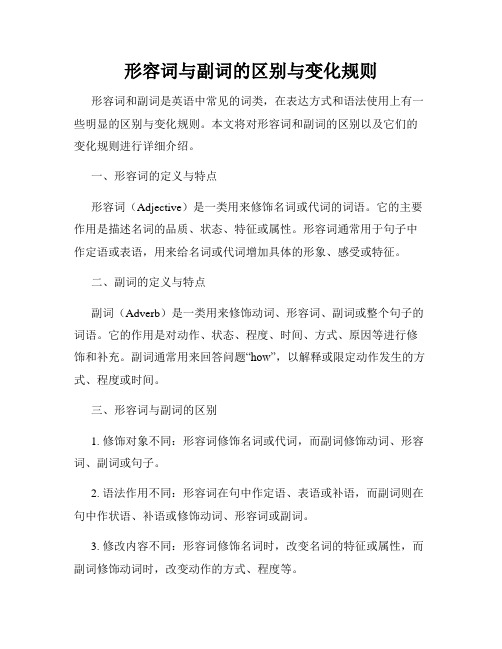
形容词与副词的区别与变化规则形容词和副词是英语中常见的词类,在表达方式和语法使用上有一些明显的区别与变化规则。
本文将对形容词和副词的区别以及它们的变化规则进行详细介绍。
一、形容词的定义与特点形容词(Adjective)是一类用来修饰名词或代词的词语。
它的主要作用是描述名词的品质、状态、特征或属性。
形容词通常用于句子中作定语或表语,用来给名词或代词增加具体的形象、感受或特征。
二、副词的定义与特点副词(Adverb)是一类用来修饰动词、形容词、副词或整个句子的词语。
它的作用是对动作、状态、程度、时间、方式、原因等进行修饰和补充。
副词通常用来回答问题“how”,以解释或限定动作发生的方式、程度或时间。
三、形容词与副词的区别1. 修饰对象不同:形容词修饰名词或代词,而副词修饰动词、形容词、副词或句子。
2. 语法作用不同:形容词在句中作定语、表语或补语,而副词则在句中作状语、补语或修饰动词、形容词或副词。
3. 修改内容不同:形容词修饰名词时,改变名词的特征或属性,而副词修饰动词时,改变动作的方式、程度等。
四、形容词的变化规则1. 基本形式:形容词的基本形式一般是原级(原形),如“big”。
2. 比较级(比较形式):形容词在比较级中加“-er”,如“bigger”。
在一些特殊情况下,形容词的比较级会发生规则变化,如“good”变为“better”、“bad”变为“worse”等。
3. 最高级(最高形式):形容词在最高级中加“-est”,如“biggest”。
同样地,一些形容词在最高级中会有规则变化,如“best”、“worst”。
五、副词的变化规则1. 基本形式:大多数副词的基本形式与形容词相同,只是作用不同,如“loud”(形容词)和“loudly”(副词)。
2. 比较级和最高级:大多数副词的比较级和最高级都是在前面加“more”和“most”,如“more slowly”、“most beautifully”。
语法专题讲解形容词和副词的用法
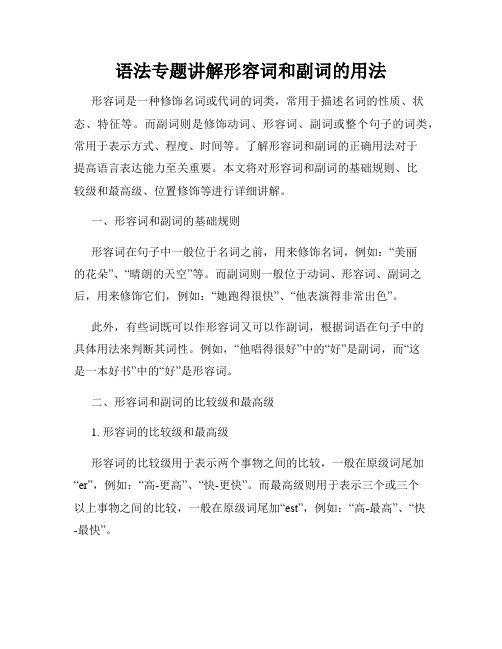
语法专题讲解形容词和副词的用法形容词是一种修饰名词或代词的词类,常用于描述名词的性质、状态、特征等。
而副词则是修饰动词、形容词、副词或整个句子的词类,常用于表示方式、程度、时间等。
了解形容词和副词的正确用法对于提高语言表达能力至关重要。
本文将对形容词和副词的基础规则、比较级和最高级、位置修饰等进行详细讲解。
一、形容词和副词的基础规则形容词在句子中一般位于名词之前,用来修饰名词,例如:“美丽的花朵”、“晴朗的天空”等。
而副词则一般位于动词、形容词、副词之后,用来修饰它们,例如:“她跑得很快”、“他表演得非常出色”。
此外,有些词既可以作形容词又可以作副词,根据词语在句子中的具体用法来判断其词性。
例如,“他唱得很好”中的“好”是副词,而“这是一本好书”中的“好”是形容词。
二、形容词和副词的比较级和最高级1. 形容词的比较级和最高级形容词的比较级用于表示两个事物之间的比较,一般在原级词尾加“er”,例如:“高-更高”、“快-更快”。
而最高级则用于表示三个或三个以上事物之间的比较,一般在原级词尾加“est”,例如:“高-最高”、“快-最快”。
如果原级词以“e”结尾,则只需在词尾加上“r”或“st”,例如:“large- larger- largest”。
而对于以一个辅音字母结尾的重读闭音节词,则要双写辅音字母,并加上“er”或“est”,例如:“big- bigger- biggest”。
2. 副词的比较级和最高级副词的比较级和最高级的构成与形容词的变化规则相似,一般在原级词尾加“er”或“est”,例如:“quickly- quicker- quickest”。
然而,有一些词的比较级和最高级是不规则的,例如:“well- better- best”、“badly- worse- worst”。
需要特别注意的是,有些词没有比较级或最高级,只能用原级形式表达。
例如,“unique”、“perfect”等词。
形容词与副词讲解
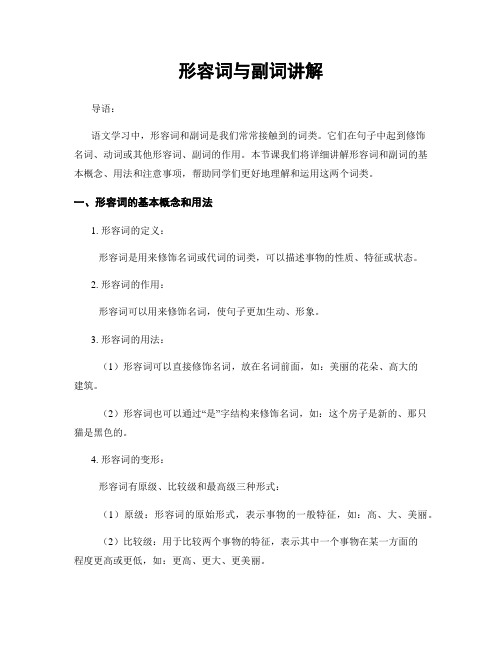
形容词与副词讲解导语:语文学习中,形容词和副词是我们常常接触到的词类。
它们在句子中起到修饰名词、动词或其他形容词、副词的作用。
本节课我们将详细讲解形容词和副词的基本概念、用法和注意事项,帮助同学们更好地理解和运用这两个词类。
一、形容词的基本概念和用法1. 形容词的定义:形容词是用来修饰名词或代词的词类,可以描述事物的性质、特征或状态。
2. 形容词的作用:形容词可以用来修饰名词,使句子更加生动、形象。
3. 形容词的用法:(1)形容词可以直接修饰名词,放在名词前面,如:美丽的花朵、高大的建筑。
(2)形容词也可以通过“是”字结构来修饰名词,如:这个房子是新的、那只猫是黑色的。
4. 形容词的变形:形容词有原级、比较级和最高级三种形式:(1)原级:形容词的原始形式,表示事物的一般特征,如:高、大、美丽。
(2)比较级:用于比较两个事物的特征,表示其中一个事物在某一方面的程度更高或更低,如:更高、更大、更美丽。
(3)最高级:用于比较三个或三个以上事物的特征,表示其中一个事物在某一方面的程度最高或最低,如:最高、最大、最美丽。
二、副词的基本概念和用法1. 副词的定义:副词是用来修饰动词、形容词、其他副词或整个句子的词类,可以表示时间、地点、方式、程度等概念。
2. 副词的作用:副词可以使句子更加丰富、准确,增加句子的表达力。
3. 副词的用法:(1)副词可以修饰动词,表示动作的方式、程度等,如:慢慢地走、非常努力地学习。
(2)副词可以修饰形容词,表示形容词的程度,如:非常漂亮、很高兴。
(3)副词可以修饰其他副词,表示副词的程度,如:非常快速地跑、很认真地听。
(4)副词可以修饰整个句子,表示整个句子的态度、语气等,如:幸运地,我们赢得了比赛。
4. 副词的变形:副词有原级、比较级和最高级三种形式,变形规则和形容词相似。
三、形容词和副词的注意事项1. 形容词和副词的区别:形容词主要修饰名词,副词主要修饰动词、形容词或其他副词。
形容词副词讲解
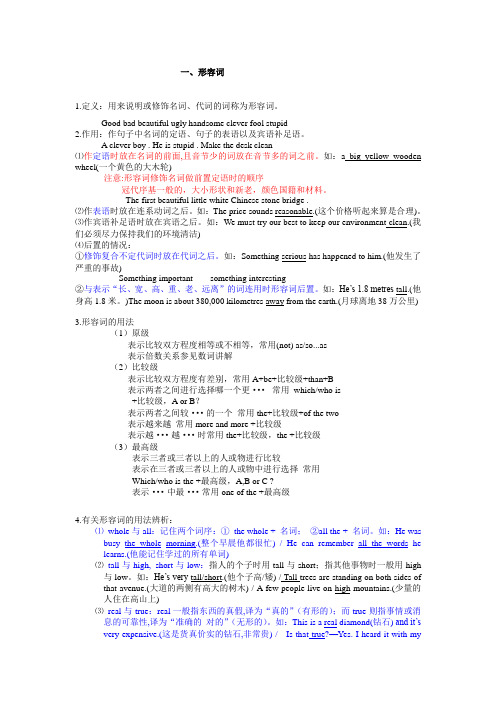
一、形容词1.定义:用来说明或修饰名词、代词的词称为形容词。
Good bad beautiful ugly handsome clever fool stupid2.作用:作句子中名词的定语、句子的表语以及宾语补足语。
A clever boy . He is stupid . Make the desk clean⑴作定语时放在名词的前面,且音节少的词放在音节多的词之前。
如:a big yellow wooden wheel(一个黄色的大木轮)注意:形容词修饰名词做前置定语时的顺序冠代序基一般的,大小形状和新老,颜色国籍和材料。
The first beautiful little white Chinese stone bridge .⑵作表语时放在连系动词之后。
如:The price sounds reasonable.(这个价格听起来算是合理)。
⑶作宾语补足语时放在宾语之后。
如:We must try our best to keep our environment clean.(我们必须尽力保持我们的环境清洁)⑷后置的情况:①修饰复合不定代词时放在代词之后。
如:Something serious has happened to him.(他发生了严重的事故)Something important something interesting②与表示“长、宽、高、重、老、远离”的词连用时形容词后置。
如:He‟s 1.8 metres tall.(他身高1.8米。
)The moon is about 380,000 kilometres away from the earth.(月球离地38万公里)3.形容词的用法(1)原级表示比较双方程度相等或不相等,常用(not) as/so...as表示倍数关系参见数词讲解(2)比较级表示比较双方程度有差别,常用A+be+比较级+than+B表示两者之间进行选择哪一个更···常用which/who is+比较级,A or B?表示两者之间较···的一个常用the+比较级+of the two表示越来越常用more and more +比较级表示越···越···时常用the+比较级,the +比较级(3)最高级表示三者或三者以上的人或物进行比较表示在三者或三者以上的人或物中进行选择常用Which/who is the +最高级,A,B or C ?表示···中最···常用one of the +最高级4.有关形容词的用法辨析:⑴whole与all:记住两个词序:①the whole + 名词;②all the + 名词。
英语语法之形容词副词讲解

形容词和副词一、形容词1)、⑴作定语时放在名词的前面,且音节少的词放在音节多的词之前。
如:a big yellow wooden wheel(一个黄色的大木轮)⑴作表语时放在连系动词之后。
如:The price sounds reasonable.(这个价格听起来算是合理)⑴作宾语补足语时放在宾语之后。
如:We must try our best to keep our environment clean.(我们必须尽力保持我们的环境清洁)⑷后置的情况:⑴修饰复合不定代词时放在代词之后。
如:Something important 一些重要的事情⑴与表示“长、宽、高、重、老、远离”的词连用时形容词后置。
如:He’s 1.8 metres tall.(他身高1.8米。
)二、副词(1)作状语1.时间副词:一般放在句首或句尾,注意,early、late、before、later、yet等一般放在句尾,already、just一般放在动词的前面。
如:We will visit the Great Wall tomorrow.(我们明天要去参观长城) /2.地点副词:一般放在句尾,但here、there还可放在句首。
如:There you can see thousands of bikes running in all directions(方向).3.方式副词:一般放在行为动之后,suddenly可以放在句首、句尾或动词之前。
如:Old people can hardly walk as quickly as young people.(老年人几乎不可能走得和年轻人一样快) / Suddenly he saw a light in the dark cave(山洞).(突然,在黑黢黢的山洞里,他看见了一丝亮光)4.程度副词:修饰动词时,放在动词之前;修饰形容词或副词时,放在形容词或副词之前。
但注意,enough总是放在被修饰的形容词或动词的后面;only位置比较灵活,总是放在被修饰的词的前面。
形容词和副词语法讲解

形容词和副词语法讲解1.形容词的用法和位置1)形容词作表语,表明主语的性质和特征,放在连系动词之后。
如:Computers are very useful in our everyday life.Leaves turn yellow in autumn.2)形容词作定语,修饰名词或不定代词,通常放在名词之前,不定代词之后。
如:This is an unhealthy diet.There is nothing important in today’s newspaper.3)形容词作宾语补足语,放在宾语之后,与其构成复合宾语。
如:You should keep your classroom clean and tidy.I found it difficult to get on well with the manager.2.副词的用法和位置1)副词修饰动词、形容词或其他副词,表示动作、状态的特征或某种性质的程度。
根据其用途与含义,副词可分为下列六大类:(1)时间副词。
常用的有:ago,before,now,then,soon,already,yet等。
(2)地点副词。
常用的有:here,there,up,down,above,below,inside,outside 等。
(3)疑问副词。
常见的有:where,when,why,how等。
(4)程度副词。
常见的有:very,much,so,too,quite,enough等。
(5)方式副词。
多由“形容词+ly”后缀构成。
如:carefully,quickly,easily,quietly 等。
(6)频度副词。
常用的有:always,often,sometimes,usually,hardly,never等。
2)副词在句中主要用作状语。
也可充当定语、表语等。
如:It’s snowing heavily outside.(状语,修饰动词)I have never heard such a beautiful voice.(状语,修饰动词)unluckily, he failed in this physics exam again.(状语,修饰整个句子)He was too excited to say a word.(状语,修饰形容词)Class is over.(表语)The weather here is different from that of Singapore.(定语)3)程度副词通常位于被修饰的形容词副词之前,但enough则要放在后面。
形容词和副词的知识点归纳
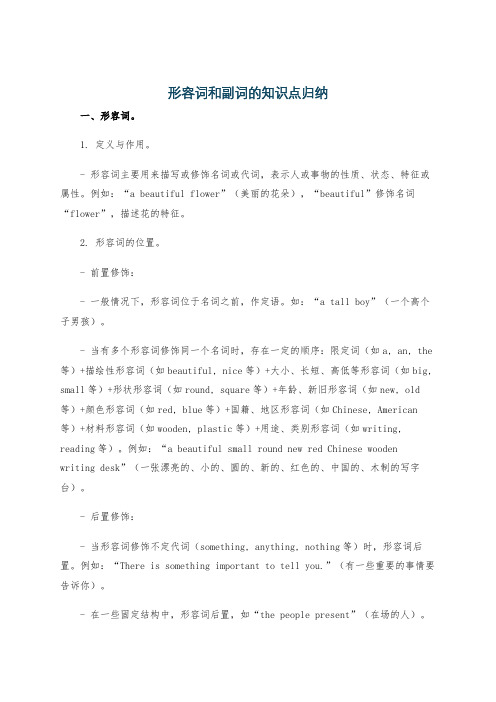
形容词和副词的知识点归纳一、形容词。
1. 定义与作用。
- 形容词主要用来描写或修饰名词或代词,表示人或事物的性质、状态、特征或属性。
例如:“a beautiful flower”(美丽的花朵),“beautiful”修饰名词“flower”,描述花的特征。
2. 形容词的位置。
- 前置修饰:- 一般情况下,形容词位于名词之前,作定语。
如:“a tall boy”(一个高个子男孩)。
- 当有多个形容词修饰同一个名词时,存在一定的顺序:限定词(如a, an, the 等)+描绘性形容词(如beautiful, nice等)+大小、长短、高低等形容词(如big, small等)+形状形容词(如round, square等)+年龄、新旧形容词(如new, old 等)+颜色形容词(如red, blue等)+国籍、地区形容词(如Chinese, American 等)+材料形容词(如wooden, plastic等)+用途、类别形容词(如writing, reading等)。
例如:“a beautiful small round new red Chinese woodenwriting desk”(一张漂亮的、小的、圆的、新的、红色的、中国的、木制的写字台)。
- 后置修饰:- 当形容词修饰不定代词(something, anything, nothing等)时,形容词后置。
例如:“There is something important to tell you.”(有一些重要的事情要告诉你)。
- 在一些固定结构中,形容词后置,如“the people present”(在场的人)。
3. 形容词的比较级和最高级。
- 规则变化:- 一般在词尾加 -er(比较级)和 -est(最高级)。
如:tall - taller - tallest。
- 以不发音的e结尾的单词,加 -r和 -st。
如:nice - nicer - nicest。
形容词副词讲解

形容词、副词形容词是用来修饰名词的,常被放在名词前作定语,或放在系动词后面作表语。
而副词则用来修饰形容词、动词,其他副词或者句子,一般位于形容词之前,动词之后或句子之首。
一、形容词常见的形容词尾缀-ing用来形容物(exciting),-ed用来形容人(exhusted),able(reliable),ry(angry),less(useless),tive(active)以–ly结尾的形容词friendly友好的---a friendly smile友好的微笑fatherly像父亲的---a fatherly teacher一位父亲式的教师lovely可爱的---a lovely girl一位可爱的姑娘lively活泼的---a lively child一位活泼的小孩lonely孤独的---a lonely traveller一位孤独的旅客deadly致命的---a deadly blow致命的一击silly傻的,无聊的---a silly question愚蠢的问题orderly秩序的---an orderly mind有条不紊的头脑manly男子气概的---a manly person具有男子气概的人daily每日的---daily work日常工作weekly每星期的---a weekly magazine周刊yearly每年的---a yearly income年收入2.比较级和最高级的句型(1)。
与……一样肯定形式用as+形容词原形+as表示“……与……一样”Tom is as fat as Mike.汤姆和麦克一样胖。
The horse is five times as heavy as the sheep.这匹马是那只羊的五倍重。
(2)不如……否定形式用not as+形容词原形+as表示“和……不一样”或not so+形容词原形+as表示“不及/不如……”Tom is not as tall as Mike.汤姆和麦克不一样高Tom is not so tall as Mike.汤姆不如麦克高(3)比形容词比较级+than。
高考英语形容词和副词讲解

2.-ed形容词通常用于说明人的感受,常译为“感到……的”,强 调人自身的情感波动;修饰事物时,则多修饰air(神态),smile (微笑),feeling (感觉),appearance (容貌),cry (哭声),face (表情),voice (声音),mood (情绪),look (表情),eye (眼神)等 显示某人情感状况的名词。
在下列情况下,形容词要放在被修饰词的后面。 (1)形容词作定语修饰somebody,something,anyone,anything, nobody等复合代词时,需后置。 Is there anything wrong with your car? 你的汽车出什么毛病了吗?
(2)以-able或-ible结尾的形容词可置于由形容词的最高级或all, every,only等词修饰的名词后面。 This is the best computer available. 这是现在可用的最好的一台电脑。 (3)形容词短语作定语要后置。 That is a problem difficult to answer. 那是一个难以回答的问题。 (4)表语形容词(alive,asleep,awake,alike,available等)作定语, 一般要后置。 The girl awake is his younger sister. 那个醒着的女孩是他的妹妹。
填一填
3.present 目前的,现在的;出场的,出席的
目前的形势
在场的雇员
答案 the present situation;the employees present
4.concerned 担心的,焦虑的;有关的,有牵连的
忧心忡忡的医生
(与……事情)有关的医生
答案 the concerned doctor;the doctor concerned
形容词与副词的区别及用法解析

形容词与副词的区别及用法解析形容词和副词是英语中常见的两种词性,它们在句子中扮演着重要的角色。
虽然它们的相似之处很多,但也有一些明显的区别。
本文将对形容词和副词的区别及用法进行解析。
一、形容词的基本特点形容词是一种用来描述或修饰名词或代词的词性。
它能描述事物的性质、状态、特征或属性。
形容词通常放在名词前面,用来限定或补充名词的含义。
比如:1. 那只可爱的小猫跳上了桌子。
2. 她披着一件漂亮的红色外衣。
在上述例句中,可爱、小、漂亮、红色等词都是形容词的典型例子。
它们修饰了名词,并且形容了事物的特征或属性。
形容词还可以用来构成比较级和最高级。
比较级用于比较两个或多个事物的程度或大小,最高级则用于表示某事物在同类事物中的最高程度或大小。
比如:1. 这本书比那本书更有趣。
2. 这是我所见过最美的风景。
二、副词的基本特点副词是一种用来修饰动词、形容词、副词或整个句子的词性。
它可以描述动作的方式、时间、地点、程度等。
副词通常放在动词、形容词或副词之后,用来进一步说明或修饰其意义。
比如:1. 他慢慢地走向前方。
2. 这件衣服非常漂亮。
在上述例句中,慢慢地和非常都是典型的副词,它们进一步修饰了动词走和形容词漂亮,使得句子的意思更加具体和准确。
副词还可以用来构成比较级和最高级。
与形容词类似,副词的比较级和最高级也用于表示程度或大小的比较。
比如:1. 他比我跑得更快。
2. 她是我们班上最聪明的学生。
三、形容词和副词用法的示例下面是一些常见的形容词和副词用法的示例:1. 形容词- 颜色:红色的、黄色的、蓝色的- 大小:小的、大的、巨大的- 性质:美丽的、聪明的、友好的2. 副词- 方式:快速地、认真地、慢慢地- 时间:早上、明天、经常- 程度:非常、很、稍微四、形容词和副词的区别总结形容词和副词的区别主要体现在以下几个方面:1. 修饰对象不同:形容词修饰名词,而副词修饰动词、形容词或副词。
2. 位置不同:形容词通常放在名词前,而副词通常放在动词、形容词或副词之后。
形容词副词讲解

一、概述形容词和副词都是起修饰作用的词类,两者的区别之一就在于它们所修饰的对象不同。
形容词主要用来说明或修饰名词或代词,描述名词或代词所代表人或事物的性质,增加或补充其含意,从而限制或缩小其适用范围。
副词的主要功能是修饰动词,形容词或其它副词有时也可以修饰全句。
boris has brains. in fact,i doubt whether any one in the class has a higher iq. 保利斯有头脑。
事实上,我怀疑班上是否有人比他智商高。
(形容词修饰名词)二、形容词1、形容词的定义形容词用来修饰和形容名词,表示名词的属性,补充说明它的意思。
a big house 一幢大房子a new bicycle一辆新自行车2、形容词的语法功能形容词修饰名词或不定代词,表示人或事物的性质、特征或状态,在句子中主要用作定语、表语、补足语、状语等。
(1)作定语①前置定语a.形容词作定语一般需放在它所修饰的名词之前并尽量靠近被修饰的词。
在这种位置上的定语叫前置定语。
语序一般为“冠词(或其他限定词)+形容词+名词”。
he is an honest boy.他是个诚实的孩子。
b.若有多个形容修饰名词,它们的位置要由它们与被修饰词的密切程度来决定。
关系最密切的形容词靠近被修饰词,而关系较远的离被修饰词则相对较远。
其排列顺序通常是:限定词+描绘性形容词+颜色+国籍、地区+用途、类别+名词。
the happy and healthy children幸福而健康的孩子们-it was great. we visited some friends, and spent the last few sunny days at the seaside. 很好。
我们拜访了朋友,在海边度过最后几天阳光明媚的日子。
巧记形容词的排列顺序:“县官行令谢国材”帮你掌握英语里形容词的排列次序。
“县”(限)代表限定词,包括:冠词、指示代词、形容词性物主代词、名词所有格、数词等。
高中英语2025届高考语法复习形容词与副词知识讲解
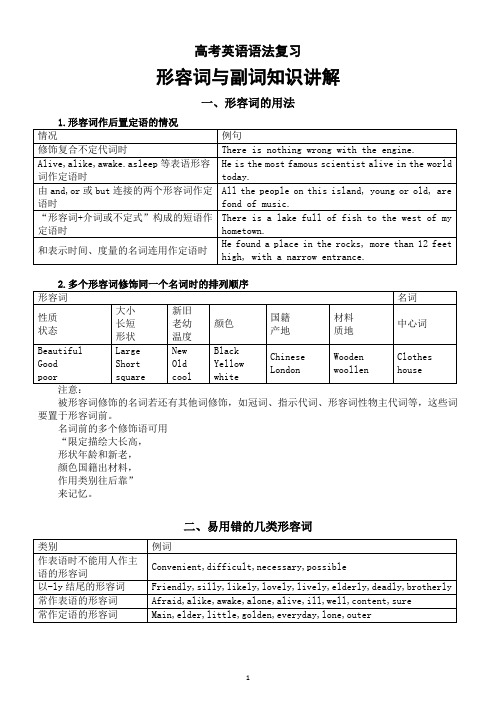
高考英语语法复习
形容词与副词知识讲解
一、形容词的用法
被形容词修饰的名词若还有其他词修饰,如冠词、指示代词、形容词性物主代词等,这些词要置于形容词前。
名词前的多个修饰语可用
“限定描绘大长高,
形状年龄和新老,
颜色国籍出材料,
作用类别往后靠”
来记忆。
二、易用错的几类形容词
三、形容词的比较等级
English is as interesting a subject as Chinese.
Which is the better of the two watches?
She is the taller of the two girls.
other或else把主语排除在比较对象之外;但如果不在同一范围比较则不需要用。
Susan is taller than any girl in her sister’s class.
四、副词的句法功能
五、副词的位置
六、副词比较等级的用法。
形容词和副词英语语法讲解PPT

• 4.与定冠词一起表示某一类人或物, 如: • The rich and the poor live very different lives . • 5.作状语,表示伴随、原因、结果等。如: • He went to bed , cold and hungry .
二、副词
• (一)副词的作用 • 1.作状语,修饰动词、形容词、副词或整 个句子。如: • He had worked hard all his life .(修饰动词) • He is very diligent.(修饰形容词) • You can find books on that subject quite easily .(修饰副词) • Luckily she was in when I called .(修饰句 子)
C. “enough”作定语时一般放在中心词前;但作 副词时只能后置。 We have enough food to eat. She is old enough to go to school. D. 以 a- 开头的形容词做定语要后置。如:alike, alive, alone, asleep, afraid, awake… 如:He is the only man awake at that time. E. 某些形容词,如: present (在场的,出席的), involved(有关的), concerned (相关的), left (剩下 的), mentioned (提及的), selected (当选的)等。 如: the students present (出席的学生) the cost involved (所需费用)
beautifully She is always dressed ____________. 2. 形容词修饰名词;副词修饰形容词,副词和全句。 He has got a serious illness.(名词) He is seriously ill.(形容词) You can find books on that subject quite easily .(副词) Luckily she was in when I called.(句子)
形容词和副词讲解
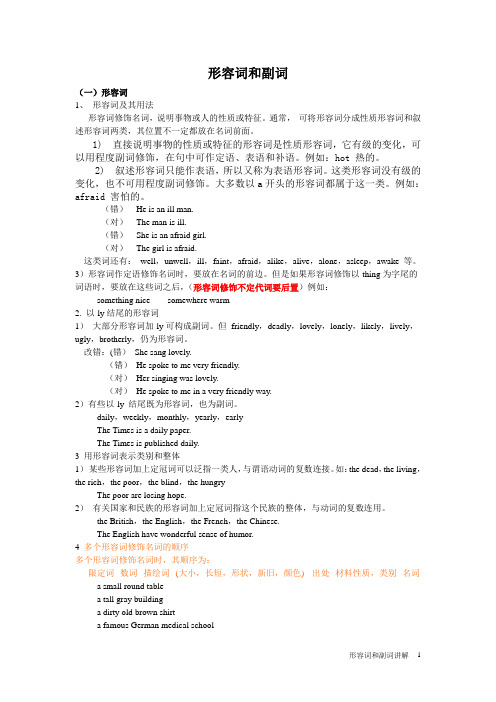
形容词和副词(一)形容词1、形容词及其用法形容词修饰名词,说明事物或人的性质或特征。
通常,可将形容词分成性质形容词和叙述形容词两类,其位置不一定都放在名词前面。
1) 直接说明事物的性质或特征的形容词是性质形容词,它有级的变化,可以用程度副词修饰,在句中可作定语、表语和补语。
例如:hot 热的。
2) 叙述形容词只能作表语,所以又称为表语形容词。
这类形容词没有级的变化,也不可用程度副词修饰。
大多数以a开头的形容词都属于这一类。
例如:afraid 害怕的。
(错)He is an ill man.(对)The man is ill.(错)She is an afraid girl.(对)The girl is afraid.这类词还有:well,unwell,ill,faint,afraid,alike,alive,alone,asleep,awake 等。
3)形容词作定语修饰名词时,要放在名词的前边。
但是如果形容词修饰以-thing为字尾的词语时,要放在这些词之后,(形容词修饰不定代词要后置)例如:something nice somewhere warm2. 以-ly结尾的形容词1)大部分形容词加-ly可构成副词。
但friendly,deadly,lovely,lonely,likely,lively,ugly,brotherly,仍为形容词。
改错:(错)She sang lovely.(错)He spoke to me very friendly.(对)Her singing was lovely.(对)He spoke to me in a very friendly way.2)有些以-ly 结尾既为形容词,也为副词。
daily,weekly,monthly,yearly,earlyThe Times is a daily paper.The Times is published daily.3 用形容词表示类别和整体1)某些形容词加上定冠词可以泛指一类人,与谓语动词的复数连接。
形容词副词的技巧性讲解 课件 2023届高考英语语法复习

度上)
old
older/elder
oldest/eldest
高考技巧
●1.比较级的标志词:than ●主1 +系动词+形容词-er+than+被比较的对象 ●主1 +系动词+more +形容词 +than+被比较的对象 ●主1 +系动词+less +形容词 +than+被比较的对象 ●主1 +系动词+the + 形容词最高级 ●2.提示词: any, much, even, far, by far, a lot, a great deal等,
3.【典例】 They were also the best and ________ (bad) years in my life.(全 国 卷Ⅲ)
解析 由并列连词and前面的“the best”可知,此处应用形容词的最高级形式。
答案 worst
4.【典例】 My mum makes the ______ (good) biscuits in the world,so I decided to ask her for help.
比较级:在原级后加-er
最高级:-est构成
如clever—cleverer—cleverest
(2)有规律变化
特殊情况
构成方法
例词
以不发音的字母-e 结尾 加-r 和-st brave—braver—bravest
变 y 为 i,再加
以“辅音字母+-y”结尾
பைடு நூலகம்
happy—happier—happiest
7.(2021·浙江卷)In 1844 they bought it for $1,200 and some land from Charles Dresser, who performed their __m__a_r_r_ia_g_e___ (marry) ceremony in 1842.
形容词副词讲解
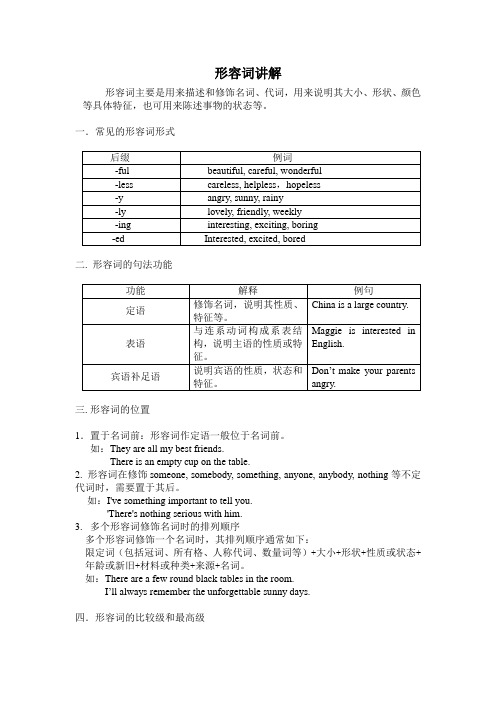
形容词讲解形容词主要是用来描述和修饰名词、代词,用来说明其大小、形状、颜色等具体特征,也可用来陈述事物的状态等。
一.常见的形容词形式二. 形容词的句法功能三.形容词的位置1.置于名词前:形容词作定语一般位于名词前。
如:They are all my best friends.There is an empty cup on the table.2. 形容词在修饰someone, somebody, something, anyone, anybody, nothing等不定代词时,需要置于其后。
如:I've something important to tell you.'There's nothing serious with him.3.多个形容词修饰名词时的排列顺序多个形容词修饰一个名词时,其排列顺序通常如下:限定词(包括冠词、所有格、人称代词、数量词等)+大小+形状+性质或状态+年龄或新旧+材料或种类+来源+名词。
如:There are a few round black tables in the room.I’ll always remember the unforgettable sunny days.四.形容词的比较级和最高级1.比较级和最高级的构成most interesting2.比较等级的用法1)两者程度相同的比较a.as+形容词原级+as如:My handwriting is as beautiful as yours.This book is as interesting as that one.b.not as/so as如:I am not as busy as you.Tom is not so bright as his brother.2)高于或低于另一方的比较比较级+than如:You look much younger than me.The weather in Beijing is drier than that in Nanjing.3)比较级+and+比较级这种结构表示事物本身程度的逐渐增长,意为“越来越……”如:Our country is becoming more and more beautiful.As summer is coming, the day is becoming hotter and hotter.4)the+比较级…,the+比较级…这种结构用来表示一方的程度随着另一方的程度的增长而增长,意为“越…越…”如:The more you eat, the fatter you will be.The shorter your talk is, the better it is.3. 最高级的用法. 表示在三者或三者以上中程度最高the+形容词最高级+名词+表示范围的短语或从句如:Jack is the tallest student in his class.He is the best runner in the team.4.比较级和最高级的修饰语1)修饰比较级的常用语和短语主要有much,even,a lot, a little等。
高考语法复习:形容词、副词讲解及提升练习(含答案解析)
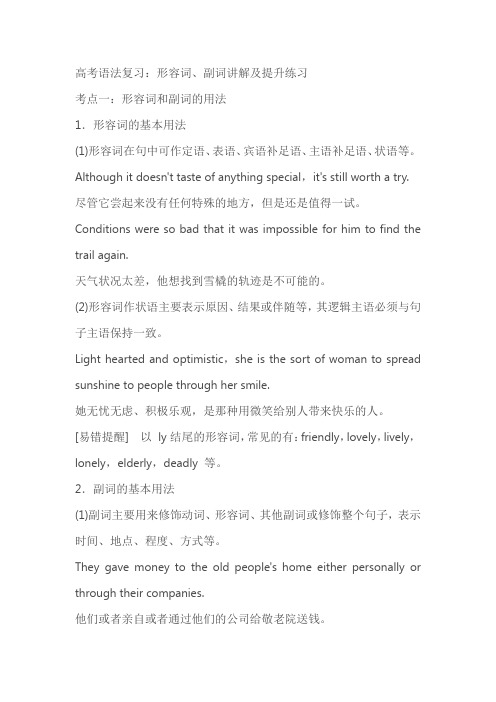
高考语法复习:形容词、副词讲解及提升练习考点一:形容词和副词的用法1.形容词的基本用法(1)形容词在句中可作定语、表语、宾语补足语、主语补足语、状语等。
Although it doesn't taste of anything special,it's still worth a try. 尽管它尝起来没有任何特殊的地方,但是还是值得一试。
Conditions were so bad that it was impossible for him to find the trail again.天气状况太差,他想找到雪橇的轨迹是不可能的。
(2)形容词作状语主要表示原因、结果或伴随等,其逻辑主语必须与句子主语保持一致。
Light hearted and optimistic,she is the sort of woman to spread sunshine to people through her smile.她无忧无虑、积极乐观,是那种用微笑给别人带来快乐的人。
[易错提醒]以ly结尾的形容词,常见的有:friendly,lovely,lively,lonely,elderly,deadly 等。
2.副词的基本用法(1)副词主要用来修饰动词、形容词、其他副词或修饰整个句子,表示时间、地点、程度、方式等。
They gave money to the old people's home either personally or through their companies.他们或者亲自或者通过他们的公司给敬老院送钱。
(2)常考的连接性副词:though“然而,可是”(用于句末);meanwhile“在此期间”;therefore/thus/consequently“因此,所以”;moreover/furthermore“而且,此外”;besides“另外,还有”;however“然而”;instead“相反,代替”;anyway/anyhow“尽管,即使这样”;otherwise“否则”。
- 1、下载文档前请自行甄别文档内容的完整性,平台不提供额外的编辑、内容补充、找答案等附加服务。
- 2、"仅部分预览"的文档,不可在线预览部分如存在完整性等问题,可反馈申请退款(可完整预览的文档不适用该条件!)。
- 3、如文档侵犯您的权益,请联系客服反馈,我们会尽快为您处理(人工客服工作时间:9:00-18:30)。
三. 形容词、副词倍数的表达法
1) 倍数as+原级 +as This room is twice as big as that one They produced three times as many TV sets as they did last year.
2)倍数+ 比较级+ than The iron box is three times heavier than the wooden one They produced twice more grain than we did.
village. 2.名词词组如 five years, ten metres 可用来修饰比较级 I am five years older than you. He is a head taller than I . This bridge is two hundred metres longer than that one.
I am no richer than you. 我并不比你有钱。(= I am as poor as you.)
*no more than = only He has no more than five dollars in his pocket.
1. enough 的用法(位置) It’s _h_o_t_ e_n_o__u_g_h_ today. 今天够热的。 He studied _h_a_r_d _e_n_o_u__g_h to pass the exam. 他学习很努力, 通过了考试。 Has he got _e_n_o_u__gh__m_o_n__e_y? 他有足够的钱吗?
原级 good / well
比较级 better
最高级 best
bad / ill / badly many / much
little far
worse more less farther/ further
worst most least farthest / furthest
old
older/ elder
形容词的句法功用 作状语
He is lying on the ground, dead. They got home, tired and hungry.
形容词的名词化
the+某些形容词,表示“某一类人”
the rich 富人 the young 年轻人
the wounded 伤员
the poor 穷人 the old 老年人 the dead 死者
The wounded are being looked after in the hospital.
1. 副词的基本功能:
作状语,修饰动词:
He drives carefully.
He plays tennis very badly.
修饰全句的副词一般放在句首:
Fortunately, he was not injured.
(状语)
形容词的句法功用 作表语 (在系动词后)
be ; look, seem, sound, smell, taste, feel, become ,get, go , grow , turn, remain / keep, prove
His efforts proved useless.。 Our monitor is handsome and strong. The cloth feels soft.
Which is right ?
a sleeping boy ✓ the boy alive ✓
an asle×ep boy
形容词的句法功用 作宾语补足语
Please keep the door open. We found him dead on the floor. Who has made him angry? 没有什么能使他伤心. Nothing can _m_a_k_e_ h_i_m_ _sa_d__. 他尽量使他的课有趣. He tried to _m__a_ke_ his lessons _in_t_e_r_e_st_in_g_. 请睁大眼睛. Please __k_ee_p_ your eyes _o_p_e_n__.
6. “越… ,就越…” the +比较级,the+比较级: The harder you work at it, the better you’ll do in it. The more you talk, the less patient he gets.
7. the+比较级(+of the two…) 指“两者中较…样的一个” I want to talk with the taller of the twins. Of the two books, I will take the thinner.
7. 5. present 8. (后置定语) 出席的,在场的 the students present 9. (前置定语) 目前的,现在的 the present situation
见《3+证书》P.74 / P. 75
6. hard / hardly
努力 / 几乎不
7. late / lately
Surprisingly, he got home so early.
2.频度副词: often, always, usually, seldom, never, sometimes,hardly 等的位置 She always goes to her aunt’s by train. He had hardly got up when the telephone rang. We usually have a discussion after class.
二. 形容词、副词比较级最高级的几种常用句型
4. the +最高级+of/ in+比较范围: He is the tallest of the boys in his class. Our country has the largest population in the world.
5. “越来越…” 比较级+ and +比较级: Winter is coming. The weather is getting colder and colder. The trees grow taller and taller year by year.
3. alive / live / lively / living --- adj.
4. alive – 表语,后置定语 “活的”
5. living – 表语、定语 “活的”
6. lively
“ 活跃的、充满生机的”
7. live [laiv] 1)“活的=living” 2) “实况转播的”
4. ill / sick 5. sick:有病的 --- ,定语, 表语 6. ill:有病的 --只作表语; 恶意的,坏的 – 作定语
一般在实义动词前,助动词、系动词、情态动词后
一.形容词、副词的比较级、最高级(规则变化)
构成法
原级 比较级 最高级
单 音节词末+er /est small smaller smallest
以-e 结尾词+r /st fine
重读闭音节须双写末 big 尾辅音字母后再+er hot /est
finer bigger hotter
迟到 / 最近
8. alone / lonely
单独 / 孤独
9. already / still / yet 已经 / 仍然,还
形容词的句法功用
形容词是用来修饰名词和代词,表示人和事物的特 征和性质,在句中作定语、表语、宾补、状语
They have just bought a new car. (定语)
The tomato soup is delicious. (表语)
I thought him honest.
(宾补)
She came back home, cold and hungry.
I smelt the fish carefully and the fish smelt terrible. The rice is growing nice. We are growing old. Milk _g_o__e_s_ bad easily in summer. He __k_e_p__t___s_i_le__n_t____ at the meeting.(保持沉默) Somertehmingaihnaes d__g_o_n__e__w__r_o_nwgith my watch. (出故障)
形容词的句法功用 作表语
有些词只能作表语,称为表语形容词.
alive; alone; awake; asleep; ashamed; afraid The boy is still asleep. The fish is still alive. 但 alive, asleep 可以放在名词后作后置定语。 The child is the only person alive in the small village after the earthquake.
I have as many books as you have.
3.不如 … not as/so +原级+ as: … less +形容词/副词+ than …
This dress is not so/as expensive as that one. This dress is less expensive than that one. Today is not so cold as yesterday. He doesn’t earn as much money as his sister does. = He earns less money than his sister does.
